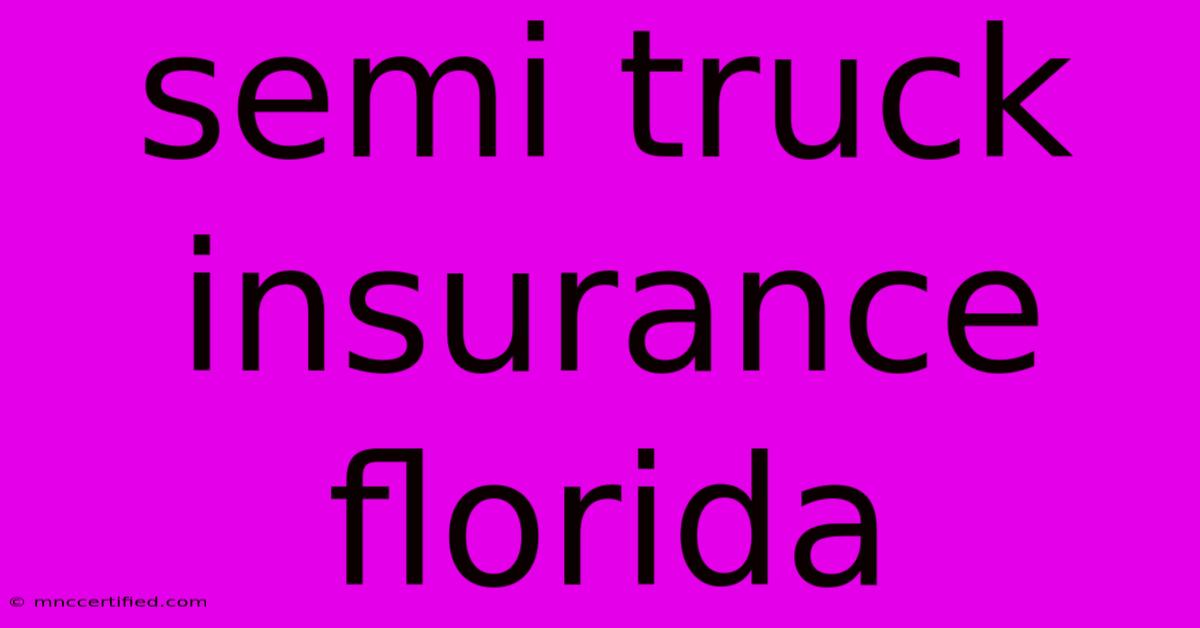Semi Truck Insurance Florida

Table of Contents
Semi Truck Insurance Florida: A Comprehensive Guide for Big Rig Operators
Finding the right semi truck insurance in Florida can feel like navigating a maze. The Sunshine State's unique landscape, bustling transportation industry, and complex insurance regulations demand a careful and informed approach. This comprehensive guide will help you understand the intricacies of securing adequate coverage, saving you time, money, and potential headaches down the road.
Understanding Florida's Trucking Insurance Requirements
Florida, like other states, mandates minimum insurance coverage for commercial vehicles. However, the specific requirements for semi-truck insurance in Florida go beyond the basic liability coverage you'd find for a passenger car. Failing to meet these requirements can lead to significant penalties, including hefty fines and suspension of your operating authority. Key aspects to consider include:
-
Liability Coverage: This protects you financially if you cause an accident resulting in property damage or injuries to others. The minimum liability limits are often insufficient for the potential damages associated with large truck accidents. Higher liability limits are crucial.
-
Cargo Insurance: If you haul goods for clients, cargo insurance protects against loss or damage to the cargo during transit. This is vital for maintaining your professional reputation and avoiding costly financial repercussions.
-
Physical Damage Coverage: This covers damage to your semi-truck itself, whether from accidents, theft, or vandalism. Protecting your significant investment is paramount.
-
Bobtail Insurance: This coverage is essential when your truck is not connected to a trailer. It provides liability protection in case of an accident while operating without a trailer. Many insurers require this separately.
Factors Affecting Semi Truck Insurance Costs in Florida
Several factors influence the cost of your Florida semi-truck insurance. Understanding these will help you make informed decisions and potentially secure more favorable rates:
-
Driving History: Your driving record is a major factor. Accidents and violations will significantly increase premiums. A clean driving record is your best asset.
-
Type of Cargo: The type of goods you haul affects risk assessment. Hazardous materials, for instance, carry higher premiums.
-
Years of Experience: More experienced drivers often qualify for lower rates.
-
Vehicle Type & Age: The age, make, and model of your semi-truck influence the cost of insurance. Newer, well-maintained trucks generally cost less to insure.
-
Safety Features: Trucks equipped with advanced safety features like collision mitigation systems may qualify for discounts.
-
Credit Score: Your credit history can impact your insurance premium. A strong credit score can lead to lower rates.
-
Insurance Company: Different insurance companies have varying rates and coverage options. Shopping around and comparing quotes is essential.
Finding the Right Semi Truck Insurance in Florida: A Step-by-Step Guide
-
Assess Your Needs: Determine the level of coverage you require based on the type of hauling you do and the value of your assets. Don't underestimate your liability exposure.
-
Get Multiple Quotes: Contact several reputable insurance providers specializing in commercial auto insurance and semi-truck insurance in Florida.
-
Compare Coverage and Prices: Carefully review the policy details and compare premiums, deductibles, and coverage limits. Don't just focus on the price; ensure the coverage is appropriate.
-
Read the Fine Print: Understand the policy exclusions and limitations before signing.
-
Choose a Reputable Provider: Opt for a financially stable and reliable insurer with a proven track record of customer service. Check reviews and ratings.
-
Maintain a Clean Driving Record: This is the single best way to keep your insurance costs low.
Off-Page SEO Strategies for Ranking Higher
To improve the search engine ranking of this article, consider these off-page SEO strategies:
- Build high-quality backlinks: Reach out to trucking blogs, forums, and websites related to Florida's trucking industry and ask them to link to your comprehensive guide.
- Engage in social media marketing: Share this article on relevant social media platforms and engage with trucking communities online.
- Participate in industry events: Networking and building relationships within the Florida trucking community can help build brand awareness and credibility.
- Local SEO: Optimize your online presence for local searches by listing your business on relevant online directories.
By following these steps, you can effectively find the right semi-truck insurance in Florida and establish a strong online presence for your business. Remember, adequate insurance is not just a legal requirement; it's a crucial element of protecting your business and your future.

Thank you for visiting our website wich cover about Semi Truck Insurance Florida. We hope the information provided has been useful to you. Feel free to contact us if you have any questions or need further assistance. See you next time and dont miss to bookmark.
Featured Posts
-
Ole Miss Vs State Live Score And Highlights
Nov 30, 2024
-
Apple Watch Black Friday Best Deals
Nov 30, 2024
-
Acceptance Insurance Sign In
Nov 30, 2024
-
Bob Bryar My Chemical Romance Passes Away At 44
Nov 30, 2024
-
Lions Bolster Linebacker Corps
Nov 30, 2024